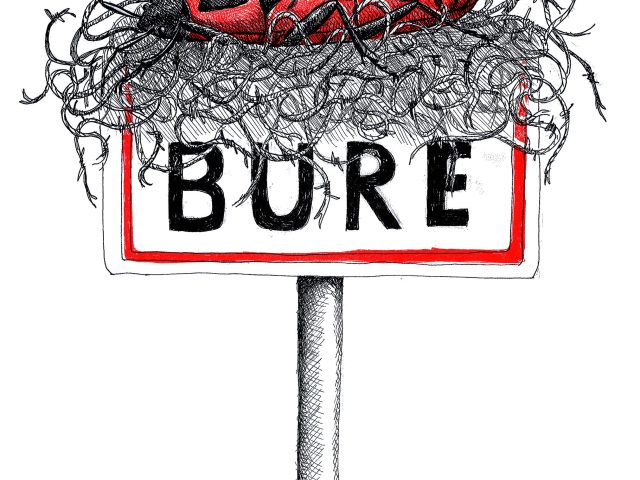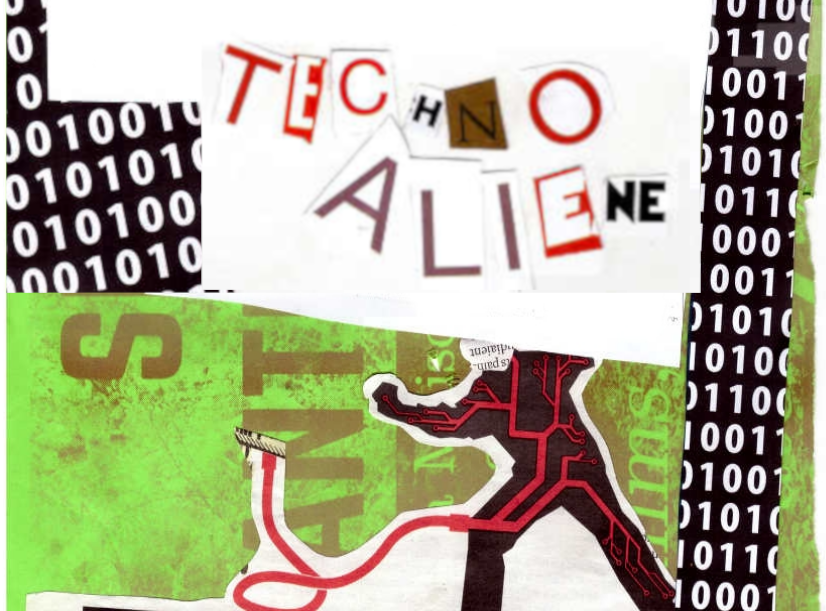TECHNO-ALIENATED – AGAINST THE TECHNICIAN SYSTEM
Reproduction of a text published in the fanzine of the antinuk week of October 2020, which transcribes the point of view of a technocritical technician.
Like many of my contemporaries, I am alienated by digital technologies. I wish to bear witness to this alienation from my technician’s point of view.
This word reflects several realities for me. It constitutes for me and some of my fellow technicians, with whom I share an ideological opposition to technostructure, a place in the militarizing hierarchy of humans forcibly implementing this technical system. In this sense, the technician is a bit like the warrant officer under the orders of the Engineer, the officer in the army of the world’s devitalization. It also constitutes part of the social identity that has been assigned to me (especially during this week), in a role that this time resembles a caste. This role is all the more respected because it appears hermetic and monolithic, freezing the member of this caste in an essentialized position. A position enclosed in a bubble floating sometimes below and sometimes above the plane of horizontality, this political aspiration which, while hazy, obviously does not accomodate the existence of castes.
Finally, the technician embodies a role that I have assigned to myself, that I have internalized. Whether it brings me joy or difficulties, it has been very difficult for me to extract myself from this role, which calls upon only a tiny part of human capacities; firstly on the technical level, because of the rigid framework imposed by the machines that accompany the technician, and even more obviously on the emotional, social, muscular, sensitive, etc. levels.
This functionalization, which, under the impulse of the individual themself, reduces the human being to a cog or a belt of the material part of the Megamachine, is the very definition of technician alienation.
While carrying out a technical task, its success or failure depends largely on the correct execution of instructions on impalpable networks, complex phenomena of electrons on components that can only be manufactured on a large scale in exotic factories costing several billion euros. Thus the familiar-looking repair performed by the technician putting the Internet back on as they could repair a chair actually depends on their inclusion as a biological prosthesis in a global digital network.
More and more user friendly digital tools are multiplying and are becoming more and more necessary and less and less fixable in a traditional and mechanical sense. In this respect, the list of victims of these technologies is growing: unemployed on the Pôle Emploi¹ website, teacher forced into online classes during Covid, inhabitants of an increasingly artificialized region invited to a digital consultation, parents who try to delay their child’s access to a computer. Despite standing in solidarity with these populations, strict captives of the technostructure’s screen appendages, the techno-critical technician unwillingly acts as the lubricant of this system each time they benevolently try to help their comrades in digital distress.
Moreover, it has happened to me, as to other technicians I believe, that I have had to assume a quasi repressive role towards other human beings to ensure the normal functioning of the machine, and even to try to compensate for its dysfunctionings: by reprimanding bad uses, by pressing commands to prepare the equipment. The human serves as an adjustment variable in a user-machine relationship, the second term of which does not offer any leverage by its very nature. The technician thus finds themself in a repressive role against their own interest, in the manner of the cop that expels the militants defending the territory in which they themself reside. This sensitive exposure to the contradictions inherent in this technical system, both for the technician themself and for the distressed people they are trying to help, no doubt explains the prevalence of technocritical engagement among technician activists.
This personal dimension allowed me during this week to consider the anti-tech struggle as an emancipatory struggle to be led to fight against the disconnection from biological life and against the daily more palpable threats carried by a technostructure against the inhabitants that it encompasses (filing, dependence, isolation of the disconnected, extractivism, energy networks …).
The use and understanding of new technical tools to defend ourselves against this very system unfortunately remains a difficult perspective to shift.
It will always be necessary to plug cables connected to millions of miles of copper and fiber optics, buy USB keys and find oneself essentialized as a resource person who will have to take the risk of opening the Pandora’s box of technological alienation while struggling to transmit their knowledge. It is in mutual aid and de-specialization that lies the hope of diminishing the isolation linked to the digital divide and the technician’s contradictions. The civilization of the Engineer needs specialists and dependent subjects (think of the nuclear industry).
Let’s kill the Engineer inside us and stop the cybernetic gangrene that compromises our biological and sensitive experience from its cloud and through its physical networks.
¹ French unemployment center
08/01/2021
Et sinon, 29 jours avant
on écrivait ça.

Solidarity with Danni’s occupation !
Since more than a year, Danni forest (Germany) is occupied. The compagny Deges wants to make the A49 longer, passing through Danni forest. They have already cut 85 hectare of forest and since a... Lire la suite
10/12/2020
Et sinon, le jour même
on a écrit ça.

End of « Criminal Conspiracy » investigation in...
Read on Reporterre « I guess they won’t kick our doors down each morning for new searches » reacted, with biting sarcasm, one of the charged individuals reached by Reporterre Wednesday, December 2n... Lire la suite
08/01/2021
